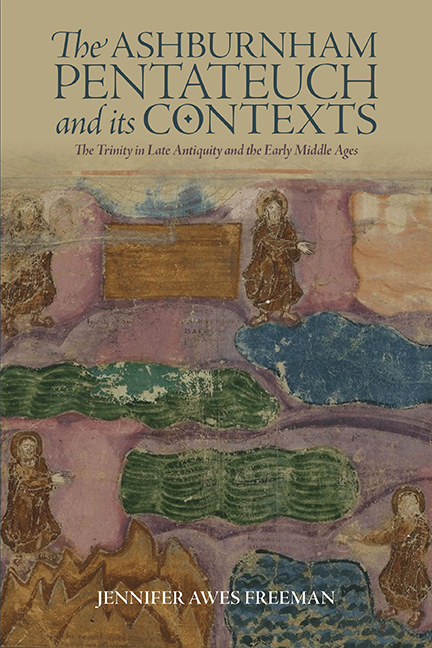Book contents
- Frontmatter
- Dedication
- Contents
- List of Illustrations
- List of Abbreviations
- Introduction: Losing and Finding the Ashburnham Pentateuch
- 1 Early Trinitarian Texts and Debates
- 2 The Trinity in Early Christian Images
- 3 Carolingian Conceptions of the Trinity
- 4 Carolingian Image Theory
- 5 The Carolingian Reception of the Ashburnham Pentateuch
- Conclusion: Possible Motivations for the Ashburnham Pentateuch Erasures
- Coda: The Afterlives of the Ashburnham Pentateuch
- Acknowledgments
- Bibliography
- Index
- ALREADY PUBLISHED
3 - Carolingian Conceptions of the Trinity
Published online by Cambridge University Press: 26 May 2022
- Frontmatter
- Dedication
- Contents
- List of Illustrations
- List of Abbreviations
- Introduction: Losing and Finding the Ashburnham Pentateuch
- 1 Early Trinitarian Texts and Debates
- 2 The Trinity in Early Christian Images
- 3 Carolingian Conceptions of the Trinity
- 4 Carolingian Image Theory
- 5 The Carolingian Reception of the Ashburnham Pentateuch
- Conclusion: Possible Motivations for the Ashburnham Pentateuch Erasures
- Coda: The Afterlives of the Ashburnham Pentateuch
- Acknowledgments
- Bibliography
- Index
- ALREADY PUBLISHED
Summary
When the early ninth-century redactor of the Ashburnham Pentateuch erased God, it was as if they had sent the two targeted members of the Trinity back into the pink primordial mists of Creation. The Ashburnham Pentateuch had been written and painted in an era of theological controversy and political instability, in which an image of an anthropomorphic Trinity carried not only doctrinal but also political significance. By the early ninth century, the implications of this image had shifted enough to warrant its modification. Placing the Ashburnham Pentateuch in the context of early medieval art will demonstrate the relative singularity of the manuscript (and particularly of its Creation image) within the library at Tours, a factor that likely contributed to the decision to edit it. Despite its apparently troubling Creation image, the Ashburnham Pentateuch was certainly valued by its Carolingian viewers, possibly because of its origins in the Roman Empire. This appreciation is evidenced by the fact that the manuscript was not only preserved, but also seems to have influenced some Carolingian depictions of postlapsarian Adam and Eve. But this influence stopped there as Carolingian depictions of Creation never included an anthropomorphic Trinity; in fact, in all extant examples, the Logos is the only visually represented Creator.
THE ROLE OF THE BOOK IN THE CAROLINGIAN RENAISSANCE
“Carolingian Renaissance” is a common phrase often used to describe the marked productivity and reform in major arenas such as law, art, literature, and liturgy during Charlemagne's rule. In the past thirty years, scholarship has questioned the traditional view that the period of about 150 years before Charlemagne constituted a dark age, devoid of learning and literacy. Instead, there was arguably a great deal of continuity with the culture and ideals of the late Roman world, as seen, for example, in the church councils, widespread literacy among the upper class, and theological writings of that period. The luxurious and innovative Ashburnham Pentateuch, which dates to this so-called “dark age” before Charlemagne, is also evidence of this continuity. Thus, it is difficult to say that there was truly a Carolingian “Renaissance,” if it in fact superseded no dark age. On the other hand, this continuity is not to be overemphasized since the exact extent of cultural activity in the period before Charlemagne, especially in Merovingian Gaul, remains uncertain.
- Type
- Chapter
- Information
- The Ashburnham Pentateuch and its ContextsThe Trinity in Late Antiquity and the Early Middle Ages, pp. 61 - 117Publisher: Boydell & BrewerPrint publication year: 2022

